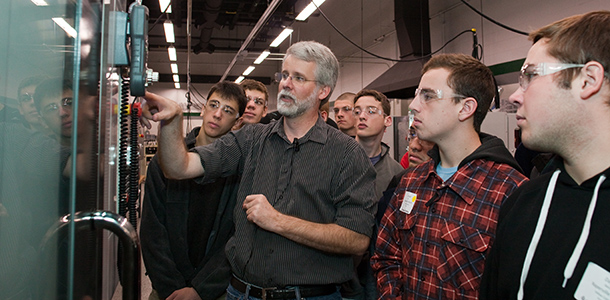
(Photo Credit: COD Newsroom/Flickr)
Originally published in Sacramento Bee Soapbox.
When the California Economic Summit convenes in Sacramento on Tuesday, regional stewards from throughout the state will be asking the hard questions about what else can be done to restore upward mobility.
While we have many pressing problems, addressing income inequality is foundational to our aspirations for healthy and safe families and neighborhoods, social justice and even environmental sustainability.
Nearly 13 million Californians live below or just above the poverty line, nearly equal to the population of Illinois.
This erosion of the California dream challenges us to reassess our collective efforts to broaden economic opportunities and build sustainable communities. The challenges are as clear as they are complicated:
▪ The cost of living, particularly housing, is rising faster than wages.
▪ Workers stuck in low-wage jobs need the skills to get better jobs and careers.
▪ California needs to align its policies to encourage more well-paying jobs.
From its inception five years ago, the summit has been premised on the reality that California’s distinct regions required tailored strategies to thrive – and they needed coherence in state policies and funding that support those regional priorities. The hundreds of steward leaders from business, government and the civic sector involved in the summit also embraced a triple bottom line – advocating for public actions that simultaneously increase economic vitality, social equity and environmental sustainability.
The specific actions – defined in the “Roadmap for Shared Prosperity” – are annually refreshed and commitments are renewed, and then pursued within and among the regions, at the state level. The 2016 roadmap elevated three “1 million challenges” to encourage solutions big enough to address the challenges.
To restore upward mobility, California needs 1 million more graduates with bachelor degrees and 1 million more workers with middle-skilled credentials over the next 10 years. The summit led a coalition that supported the creation of a new $200 million Strong Workforce Program for promoting career technical education.
With supply falling far below demand – the housing crisis is just that. Even with a growing economy, California will lose ground to poverty if housing supply is not significantly increased. And we will lose ground to climate change if sustainable community plans are not implemented. The summit has convened builders, housing advocates, equity groups, environmentalists and local government leaders to develop a policy framework for state and local actions.
Even before the drought, California was using more water than systems could reliably provide. And all along regional resource managers were exploring innovative ways to manage watersheds to simultaneously adapt to climate change, ensure reliable supplies and restore ecosystems. The summit is working with those leaders to identify state regulatory and finance actions that slow down innovation.
We know that for the workforce it’s critical that we connect employers and local community colleges so that courses can be aligned with the needs of those hiring; for housing it is important that we identify a new permanent revenue source for housing development and that for our chronic water challenge that we identify governance options to support integrated and watershed-scale solutions that identify funding and financing options.
It’s not hyperbole to say they must be done. All of these challenges and the resulting policy actions affect Californians, and mores specifically the economically vulnerable that we can’t afford to leave behind.
The power of the Economic Summit is derived from diverse people from diverse places coming together for connected actions that support a state that is more prosperous, equitable and sustainable.
It’s a vehicle that our state needs more now than ever.
Join us.
Jim Mayer is CEO of California Forward. Bill Mueller is CEO of Valley Vision and a leader of the California Stewardship Network.

